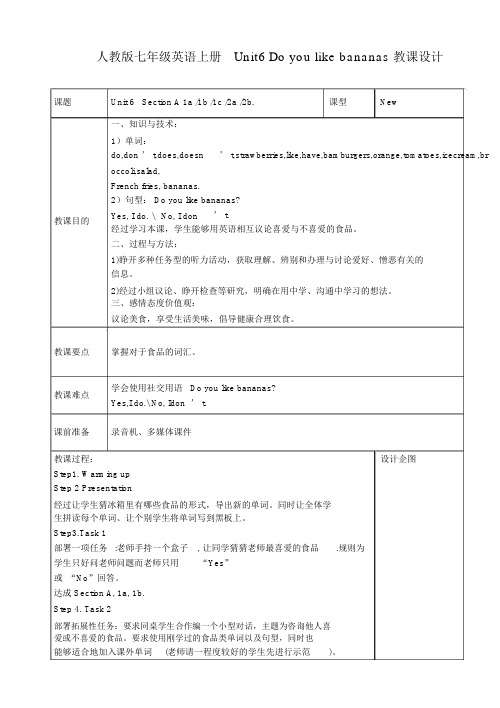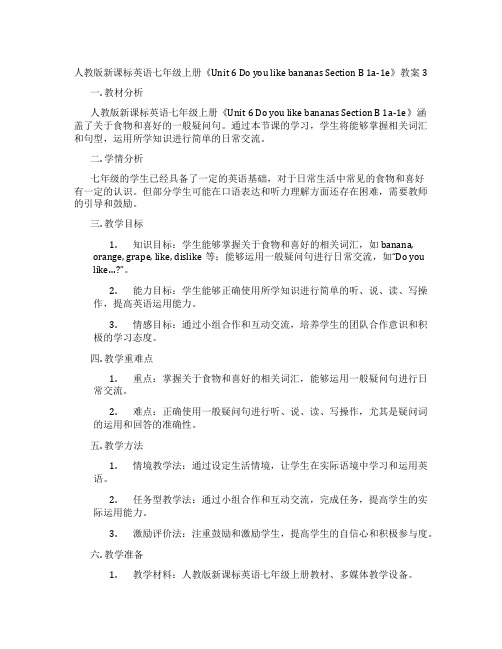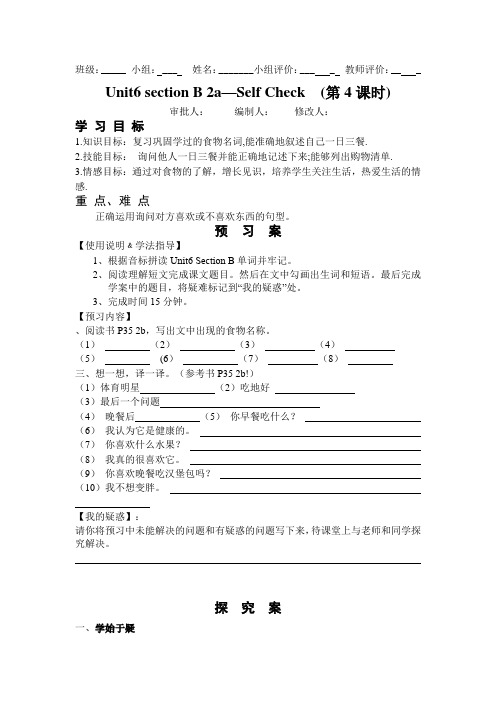河北省石家庄市复兴中学人教版七年级英语上册 Unit 6 Do you like bananas 补救达标案(无答案)
人教版七年级上册英语《Unit 6 Do you like bananas Section A》课件

2. Make a conversation about the
food you like and don’t like. 根据自己对食物的喜欢与不喜 欢情况编写一组对话。
Homework 作业
Tips
1. Eat healthy food. 健康的饮食
2. Exercise more. 经常锻炼身体
i o r a n g e smk
4. eggs
n x e t a s a a w g 5. pears
v f a o n q r l h a 6. salad
zd l absau
7. bread
g i synd
1a Match the words with the things in the picture.
pears
potatoes
ice-cream
strawberries carrots oranges
milk salad
用动词“like”表示对食物的喜欢或不喜欢
-- Yes, I do. / No, I don’t.
1. Collect more new words about food. 收集更多与食物有关的词汇。
根据图片内容练习对话。
中国传统美食 Traditional Chinese Food
Beijing Duck 北京烤鸭
Dumplings 饺子
Hot Pot 火锅
Zongzi 粽子
Barbecue 烤肉(串儿)
Noodles 面条
Make a Survey 做一个调查报告
调查你的同学或老师,看看表中的食物他们喜欢什么,
bread
人教版七年级英语上册Unit6Doyoulikebananas教案

人教版七年级英语上册Unit6 Do you like bananas教课设计课题Unit 6 Section A 1a /1b /1c /2a /2b. 课型New一、知识与技术:1)单词:do,don ’ t,does,doesn ’ t,strawberries,like,have,bamburgers,orange,tomatoes,icecream,broccoli,salad,French fries, bananas.2)句型: Do you like bananas?教课目的Yes, I do. \ No, I don ’ t.经过学习本课,学生能够用英语相互议论喜爱与不喜爱的食品。
二、过程与方法:1)睁开多种任务型的听力活动,获取理解、辨别和办理与讨论爱好、憎恶有关的信息。
2)经过小组议论、睁开检查等研究,明确在用中学、沟通中学习的想法。
三、感情态度价值观:议论美食,享受生活美味,倡导健康合理饮食。
教课要点掌握对于食品的词汇。
教课难点学会使用社交用语 Do you like bananas? Yes,I do.\ No, Idon ’ t.课前准备录音机、多媒体课件教课过程:设计企图Step1. Warming upStep 2 Presentation经过让学生猜冰箱里有哪些食品的形式,导出新的单词。
同时让全体学生拼读每个单词、让个别学生将单词写到黑板上。
Step3.Task 1部署一项任务:老师手持一个盒子, 让同学猜猜老师最喜爱的食品.规则为学生只好问老师问题而老师只用“Yes”或“No”回答。
达成 Section A, 1a, 1b.Step 4. Task 2部署拓展性任务:要求同桌学生合作编一个小型对话,主题为咨询他人喜爱或不喜爱的食品。
要求使用刚学过的食品类单词以及句型,同时也能够适合地加入课外单词(老师请一程度较好的学生先进行示范)。
Step 5.达成课文32 页 Section A 听力练习activity 2a, 2b.Setp 6.当堂听写听写单词与句型,进一步稳固本课学习内容,并将本课应掌握的单词和句型落实到“写”上,使学生不只会说同时会写。
人教版英语七年级上册Unit6 Do you like bananas?Section A1a-2c

bananas
oranges
tomatoes
strawberries
pears
hamburgers
— What’s this?
— It’s _m__il_k_. /mɪlk/
--Does he/she like…? --Yes, he/she does. He/She likes….
— Do you like milk ?
模仿要求:(共10分) 1.声音响亮(3分) 2.注意升降调(3分) 3. 注意连读和失去爆破 (2分) 4.洋腔洋调(2分)
healthy
unhealthy
A:I like…and…,but I don’t like…or….
B: ---Does he/she like …? C: ---Yes, he/she does. He/She likes...
2. — _D_o_e_s_ your father like _p_e_a_r_s_? — No. He _d_o_e_s_n_’t_ like _p_e_a_r_s_.
3. — Let’s _h_a_v_e_ sala_l_ik_e__ salad.
--No, he/she doesn’t.
— Yes, I do. I like milk .
He/She doesn’t like….
No, I don’t . I don’t like milk .
bread
/bred/
salad
/'sæləd/
ice-cream
/,aɪs'kri:m/
可数名词 可数,能计量,有复数形式 orange apple banana pear strawberry tomato hamburger
人教版七年级英语上册Unit6 Do you like bananas Section A 1a-2

1 A: Do you like bananas? B: Yes, I do.
3
A: Do you like oranges? B: Yes, I do.
2a Listen and circle the food you hear.
hamburgers pears tomatoes strawberries
Apple round ,apple red.
苹果圆,
苹果红
Apple juicy ,apple sweet. 苹果多汁, 苹果甜
Apple apple I love you. 苹果苹果 我爱你
Apple sweet I love to eat.
苹果甜甜
我爱吃
What’s the song about?这首歌关于什么?
— Let’s have _________.
— Oh, no. — No? — I don’t like
__________.
Make a survey采访三位同学Do you like…? Yes用No用填好表格并根据表格写一段话
food name
I Tony
Linda
….
I like hamburgers,but I don't like oranges. Tony likes tomatoes,but he doesn't like apples. Linda likes apples, but she doesn't like tomatoes.
Look and say
Game 1
Guess!
ice Байду номын сангаасream
a tomato bananas
人教版新课标英语七年级上册《Unit 6 Do you like bananas Section B

人教版新课标英语七年级上册《Unit 6 Do you like bananas Section B 1a-1e》教案3一. 教材分析人教版新课标英语七年级上册《Unit 6 Do you like bananas Section B 1a-1e》涵盖了关于食物和喜好的一般疑问句。
通过本节课的学习,学生将能够掌握相关词汇和句型,运用所学知识进行简单的日常交流。
二. 学情分析七年级的学生已经具备了一定的英语基础,对于日常生活中常见的食物和喜好有一定的认识。
但部分学生可能在口语表达和听力理解方面还存在困难,需要教师的引导和鼓励。
三. 教学目标1.知识目标:学生能够掌握关于食物和喜好的相关词汇,如banana,orange, grape, like, dislike等;能够运用一般疑问句进行日常交流,如“Do you like…?”。
2.能力目标:学生能够正确使用所学知识进行简单的听、说、读、写操作,提高英语运用能力。
3.情感目标:通过小组合作和互动交流,培养学生的团队合作意识和积极的学习态度。
四. 教学重难点1.重点:掌握关于食物和喜好的相关词汇,能够运用一般疑问句进行日常交流。
2.难点:正确使用一般疑问句进行听、说、读、写操作,尤其是疑问词的运用和回答的准确性。
五. 教学方法1.情境教学法:通过设定生活情境,让学生在实际语境中学习和运用英语。
2.任务型教学法:通过小组合作和互动交流,完成任务,提高学生的实际运用能力。
3.激励评价法:注重鼓励和激励学生,提高学生的自信心和积极参与度。
六. 教学准备1.教学材料:人教版新课标英语七年级上册教材、多媒体教学设备。
2.教学辅助材料:食物图片、卡片、听力材料等。
七. 教学过程1.导入(5分钟)教师通过展示不同食物图片,引导学生进行复习,为新课的学习做好铺垫。
2.呈现(5分钟)教师展示1a-1e部分的材料,让学生初步感知和理解文章内容。
3.操练(15分钟)教师学生进行分组练习,让学生模拟文章中的对话,进行角色扮演。
七年级英语上册Unit6Doyoulikebananas

My father likes __b__lu, ebut he doesn’t like ___.red
My mother likes _b_l_a_ck_, but she doesn’t like _y_e_ll_o_w__.
第二十六页,共三十六页。
1. What food / sports / colors do you like and dislike?
Do you like … for lunch?
Do you like … for dinner?
No, I don’t. I like oranges.
Yes, … /
No, …
Yes, … /
No, …
第十二页,共三十六页。
Fill in the chart.
Breakfast
Lunch
Dinner
_I_d_o_n_’_t_li_k_e_t_o_m__a_to_e_s_. And for dinner, __I_l_ik_e _ch__ic_k_e_n__a_n_d__r_ic_e_,_b__u_t_I_d_o__n_’t__li_k_e_a__p_p_le. sFor
breakfast, __M__ik_e_ likes ___e_g_g_s_a_n_d__m_i_l_k_, _b_u_t _h_e__d_o_e_s_n_’_t__h_e_likes _h_a_m__b_u_r_g_e_r_s_a_n_d__s_a_l_a_d_,_b_u_t__h_e_d_o_e_s_n_’_t_l_ik_e
第九页,共三十六页。
What do you have for your supper every day?
第十页,共三十六页。
Unit-6-Do-you-like-bananas-?-Section-B课件

We are going to read about
Cindy’s healthy eating habits.
2b Read the magazine article and circle the food words. Sports Star Eats Well!
—__N_o_,_t_h_e_y_d_o_n_'_t.________
三. 完成句子 1.我经常早餐喝牛奶。 I often have milk _f_o_r___ __b_re_a_k_f_a_st__. 2. 我们一起吃午餐吧。 Let's _h_a_v_e___ __l_u_n_c_h__ together. 3. 杰克不喜欢沙拉。 Jack __d_o_e_s_n_'t_ ___li_k_e__ _s_a_l_ad____.
What food do you like?And what food does your friend like? I like hamburgers,and my friend likes salad.
I like milk,and my friend likes apples.
Do you know the following food?
Warming up
Look at the pictures and write sentences.
Tom likes __b_an_a_n_a_s_a_n_d__s_tr_a_w_b_e_r_ri_e_s__.
Sally likes _i_c_e-_c_r_e_am___an_d__h_a_m_b_u_r_g_e_r_s_.
人教版七年级英语(上册)Unit 6 Do you like bananas(五)教案

John’s eating habits
For breakfast For lunch For dinner
John’s eating habits
For breakfast eggs and some fruits For lunch For dinner
Jack’s eating habits
Q1: What food does Jack eat every day? Jack eats lots of healthy food every day.
Q2: What unhealthy food should John stop eating?
Q2: What unhealthy food should John stop eating?
Jack and Bill are my good friends. We eat different food every day.
I like lots of food. For breakfast, I eat eggs and some fruits. I like oranges and bananas. For lunch, I have hamburgers and some salad. For dinner, I have chicken and some vegetables. I like carrots and tomatoes.
Bill’s eating habits
For breakfast nothing For lunch hamburgers For dinner French fries
John compares (比较) his friends’ eating habits.
人教版七年级上册 Unit 6 Do you like bananas_ Section B

Unit 6 do you like bananas? Section B (1a-1e)Teaching aims:1.Master the words about vegetables and fruit.2.Talk about likes and dislikes.3.Key sentences:What do you like for breakfast/ lunch/ dinner?Do you like....? Yes, l do./ no, i don’t.Does he/ she like... ? Yes, he/ she does. No, he/ she doesn’t.4.Listen and find the key information.Teaching difficult and important points:1.Be able to talk about likes and dislikes;2.Be able to talk about eating habits by using these sentences:What do you like for breakfast?What do you like for lunch?What do you like for dinner?Teaching steps:Step 1. Lead inKnowledge ReviewDictation the words and phasesStep 2. Free talkWhat do you eat for breakfast?What do you eat for lunch?What do you eat for dinner?Which do you think is healthy food?Which do you think is unhealthy food?Step 3. PresentationTask 1. Write the number of each word next to the correct food.(work on 1a) Task 2. How many other words can you add to the lists? (work on 1b)Step 4. Group workTalk about eating habits“ what do you like for breakfast/ lunch/ dinner? ”Step 5. Listen activitiesTask 1. Listen and circle the food you hear in 1a.Task 2. Fill in the chart.Task 3. Ask and answer questions about what sally and tom like and don’t like.Step 6. PracticeDoes sally / tom like...?Yes, she / he does.No, she /he doesn’t.Step 7. Exercise一、单项选择1. Wu Ling likes pears but she ___ bananas.A. likesB. don’t likeC. doesn’t like2. —_____ your brothers like hamburgers?—Yes, ______.A. Do; they doB. Does; he does3. We don’t have ______. Let’s go and buy(买) some tomatoes and carrots.A. vegetablesB. foodC. hamburger4. Look! The chicken ______ on the table and the pears ______ in the bag.A. is; isB. are; areC. is; are5. —Let’s ______ some vegetable salad then.—Sounds good.A. likeB. haveC. find C. Are; they are二、句型转换1. He eats chicken every day. (改为一般疑问句)______ he ______ chicken every day?2. Tom has hamburgers for dinner.(改为否定句)Tom _______ _____ hamburgers for dinner.3. I have two eggs for breakfast. (划线部分提问)_____ _____ you ______ for breakfast?4. Mary likes fruit salad. (改为一般疑问句)______ Mary ______ fruit salad?5. They like bananas for dinner. (改为否定句)They _____ ____ bananas for dinner.6. —Does your sister like oranges? (作否定回答)—___, _____ _______.7. We have some fruit after dinner. (改为由let开头的祈使句)_____ ____ some fruit after dinner.8. Paul likes milk. He doesn’t like bread. (合为一句)Paul likes milk, ____ he doesn’t like bread.。
人教版英语七年级上册 Unit 6 Do you like bananas_ Section B

Unit 6 Do you like bananas?Teaching aims and demands:1.Learn to write aboutwhat people like and dislike.2.Learn by reading and writing3. Try to keep a balanced diet..Teaching Key points:Key vocabulary:runner, lots of, dessert eat, run, star, healthy, food, list.Key structures:What do you have for breakfast/ lunch/ dinner?For breakfast, I have…What does he/ she have for breakfast/ lunch/ dinner?For breakfast, he/ she has….Teaching Difficult Points:Students can use the key words and the target language they are learning to describe situations in their own lives.Teaching ProceduresStep 1 Warming upMemory challengeShow some words about the food in groups of two, four or six on the screen quickly, let the students say out the words as many as they can to revise the words.Step 2 Presentation1. Present the new words by making conversations with students. Show some pictures and words on the screen to help.T: Do you like sports? I like playing football/ baskball /table tennis(Show the students a picture of Liu Xiang.)T: Yes, he is running. Now, read after me, run. He is Liu Xiang. He’s a runner. Now he is very famous in China. Maybe everyone knows him. He is a sport star. S-T-A-R,star.S: S-T-A-R,star.T: Liu Xia ng likes sports. He runs every day. He is healthy and he doesn’t like dessert. Do you know Healthy and dessert? Healthy means “健康的”. Can you guess the meaning of unhealthy?Ss: ....T: Yes, you are clever. Read after me, healthy, unhealthy.Ss: Healthy, unhealthy.T: Look at these pictures. (Show these pictures of dessert.) They are all dessert. In Chinese it means “甜食”.We often eat it after the important dishes. Read after me, dessert, D-E-S-S-E-R-T, dessert.Ss: D-E-S-S-E-R-T, dessert.2. (Show some food pictures.)T: Now look at the pictures of these foods.What kind of food do you think are healthy or unhealthy? Discuss in four people and fill in the chart.Healthy food Unhealthy food3. Ask some groups to report.S: … are healthy food, … are unhe althy food.T: So we eat more healthy food and less unhealthy food. Healthy food is good for our health, but unhealthy foodis bad for our health.Step3 Reading1.Have Ss read thearticle in 3a. Answer any Qs Ss may have about the content of it.2.Read the instruction Ask students to draw the items mentioned in the note in the picture.3.Ss complete the task.4.Check their work.Step4 Writing1. Call attention to the pictures, and ask Ss which one is lunch and which one is dinner..2. Call attention to the gap-fill exercise.3. Read the instruction for 3b.4. Ask Ss to finish filling the blanks..4. Check the answers by asking students to read the notes aloud.Step5 Self check1. Do 1. Ask them to check all the words they know. Find out the meanings of any words they don’t know.2.Write five new words in their V ocab-builder on p108. share their lists with other students.Step6.Homework1, Review this unit.2. Finish off the exercises in the workbook.3. Please write about what you like for breakfast, lunch and dinner.。
人教版新课标英语七年级上册《Unit 6 Do you like bananas Section B

人教版新课标英语七年级上册《Unit 6 Do you like bananas Section B 1a-1e》教学设计3一. 教材分析人教版新课标英语七年级上册《Unit 6 Do you like bananas Section B 1a-1e》主要讲述了食物和喜好。
本节课的主要内容是学习一般现在时的肯定句和否定句,以及运用所学生词进行简单的交流。
通过本节课的学习,学生能够掌握一般现在时的基本结构,运用所学知识进行简单的日常交流。
二. 学情分析七年级的学生已经初步掌握了英语学习的基本语法和词汇,具备一定的听说读写能力。
但是,对于一般现在时的运用还不够熟练,需要通过大量的练习来巩固。
此外,学生对于食物的喜好程度不同,需要在教学中充分考虑这一点,激发学生的学习兴趣。
三. 教学目标1.知识目标:学生能够掌握一般现在时的基本结构,并能运用所学知识进行简单的日常交流。
2.能力目标:学生能够听懂、会说、会读本节课所学内容,提高学生的听说读写能力。
3.情感目标:通过本节课的学习,学生能够培养对英语学习的兴趣,增强自信心。
四. 教学重难点1.重点:一般现在时的基本结构。
2.难点:一般现在时的肯定句和否定句的运用。
五. 教学方法采用任务型教学法,通过大量的练习和实际操作,让学生在实践中掌握一般现在时的运用。
同时,运用情境教学法,创设真实的生活情境,激发学生的学习兴趣。
六. 教学准备1.教师准备:备好课件、教案、练习题等相关教学材料。
2.学生准备:预习本节课内容,熟记单词。
七. 教学过程1.导入(5分钟)利用多媒体展示各种食物图片,引导学生谈论自己喜欢的食物。
教师通过提问引导学生回答,例如:“Do you like apples?”, “Yes, I do. / No,I don’t.”,激发学生的学习兴趣。
2.呈现(10分钟)教师展示1a图片,让学生看图猜测食物,并说出对应的食物单词。
然后,让学生听1a录音,跟读对话,注意语音语调的准确性。
英语人教版七年级上册Unit6 Do you like bananas 第一课时

Unit 6 Do you like bananas?保亭响水镇金江学校黄朝政第1课时SectionA1a—1c学习目标:知识与技能:1、熟练掌握本课单词.2、谈论对方喜欢或不喜欢的食物。
过程与方法:通过听说等一些活动培养良好的听力习惯和能力,再通过独学和小组合作,学会使用本单元重点句型。
情感态度与价值观:通过谈论饮食喜好的话题,贴近学生的生活,激发学生学习兴趣。
重点、难点:1、名词的复数形式。
2、熟练使用目标语言进行对话A:Do you like bananas?B: Yes,I do.I like bananas. /No,I don't.I don't like bananas.Teaching proceduresStep1 leading in1.The teacher shows a banana and say: I have a banana.I like bananas .Do you like bananas? Yes,I do.Today we’ll learn unit6 Do you like bananas?Step 2 Presentation1.Students learn the countable nouns and sentence structures ,try to use them.T: What’s that?Ss: It’s an apple.T: What are those?Ss: They’re two apples.T: Do you like apples?Ss: Yes, I do. I like apples. No ,I d on’t. I don’t like apples.(Present the new words banana, hamburger, tomato, strawberry in the same way.)2. Students learn the uncountable nouns and sentence structures, try to use them.T: What’s this? It’s milk/salad/broccoli/ice cream/bread.T: Do you like milk/salad/broccoli/ice cream/bread?Ss: Yes, I do. I like...Ss: No ,I don’t. I don’t like...Step 3 Doing the exercise 1a1.Ask the students to read the words together.2.Match the words with the things in the pictures in two minutes.3.Check the answers.Step 4 Practice the conversations.Look at the pictures and make conversations like this.A: Do you like …(s)?B: Yes. I do. I like…. No ,I don’t. I don’t like ….Step 5 Listening (1b)a.Listen to the tape for the first time. Just listen.b.Listen to the tape for the second time and number the conversations.c.Check the answers.Step 6 Chain practices (1c)Practice the conversations in groups, in pairs.Step 7 SummaryA: Do you like …(s)?B: Yes. I do./No, I don’t .uncountable nouns(不可数名词)milk, salad, broccoli, ice-cream, breadcountable nouns (可数名词)bananas, apples, oranges, strawberries, pears, tomatoes,Step 8 Homework1. To revise the new words and pay attention to the uncountable and countable nouns2. To do a survey of your families by the following sentences structures. A: Do you like…? B: Yes. I do. I like…/No, I don’t. I don’t like…。
人教版七年级上册英语Unit 6 Do you like bananas_section B 2a—

班级:_____ 小组: ___ 姓名:_______小组评价:___ _ 教师评价:__ _ Unit6 section B 2a—Self Check (第4课时)审批人:编制人:修改人:学习目标1.知识目标:复习巩固学过的食物名词,能准确地叙述自己一日三餐.2.技能目标:询问他人一日三餐并能正确地记述下来;能够列出购物清单.3.情感目标:通过对食物的了解,增长见识,培养学生关注生活,热爱生活的情感.重点、难点正确运用询问对方喜欢或不喜欢东西的句型。
预习案【使用说明﹠学法指导】1、根据音标拼读Unit6 Section B单词并牢记。
2、阅读理解短文完成课文题目。
然后在文中勾画出生词和短语。
最后完成学案中的题目,将疑难标记到“我的疑惑”处。
3、完成时间15分钟。
【预习内容】、阅读书P35 2b,写出文中出现的食物名称。
(1)_(2)_(3)__(4)__(5)(6)_ (7)_ _(8)三、想一想,译一译。
(参考书P35 2b!)(1)体育明星_(2)吃地好(3)最后一个问题_______(4)晚餐后(5)你早餐吃什么?(6)我认为它是健康的。
(7)你喜欢什么水果?(8)我真的很喜欢它。
(9)你喜欢晚餐吃汉堡包吗?(10)我不想变胖。
【我的疑惑】:请你将预习中未能解决的问题和有疑惑的问题写下来,待课堂上与老师和同学探究解决。
探究案一、大声High起来!【学习过程】1.Group work:Read 2b and answer the questions.(1) Who is the volleyball star?(2) Does Cindy like fruit? Why?(3) What does Cindy really like?(4) What does Cindy think of hamburgers?(5) What does Cindy eat for dinner?(6) What does Cindy think of ice-cream?二、根据文中的内容谈谈辛迪的饮食习惯,仿照例子写5句,(参考书P35. 2c)例:Cindy likes healthy food.1、Cindy2、Cindy3、Cindy4、Cindy doesn’t5、Cindy doesn’t2.Pair work(3a):Ask your friends about their eating habits then complete the survey. 例:Do you like salad for lunch?3.根据3a完成3b的内容,并写一段话,谈谈你和你朋友的三餐。
- 1、下载文档前请自行甄别文档内容的完整性,平台不提供额外的编辑、内容补充、找答案等附加服务。
- 2、"仅部分预览"的文档,不可在线预览部分如存在完整性等问题,可反馈申请退款(可完整预览的文档不适用该条件!)。
- 3、如文档侵犯您的权益,请联系客服反馈,我们会尽快为您处理(人工客服工作时间:9:00-18:30)。
Unit 6 Do you like bananas? 补救达标
班级姓名小组第号【基础训练】
Ⅰ.根据汉语意思完成单词拼写
1.s(星星,明星)
2.h(习惯)
3.h(健康的)
4.r(真正地)
5.q(问题)
6.w(想要)
7.f(肥胖的)
8.w(好)
Ⅱ.翻译短语
9.一个体育之星
10.一个排球明星
11.饮食习惯
12.吃得好
13.健康食品
【综合运用】
Ⅰ.单项填空
1. Beckham is a soccer star.He plays soccer .
A.good
B.very well
C.fine
D.nice
2.What does he like lunch?
A.for
B.to
C.at
D.in
3. Grandma Chen eats many every day.
A.chicken
B.salad
C.bread
D.carrots
4. My family vegetables.
A.like
B.likes
C.eating
D.like eat
5.Strawberries fruit.
A.is
B.are
C.be
D.does
Ⅱ.根据汉语意思完成句子
6.体育明星们吃得很好。
Sports stars.
7.她有健康的饮食习惯。
She has.
8.你早餐喜欢吃什么?
do you?
9. 我喜欢冰激凌,可我不吃它。
I like, I don’t it.
10.我不想长胖。
I don’t want.
Ⅲ.阅读理解
Cindy Smith is a volleyball star.She has healthy eating habits.She says she loves fruit and she likes fruit for breakfast.She likes oranges and apples, but she doesn’t like bananas.
For lunch, she says she really likes salad.She doesn’t like hamburgers for dinner.She doesn’t think they’re healthy.She likes chicken for her dinner.As for(至于)ice-cream, she says she likes ice-cream,but she doesn’t eat it.She doesn’t want to be fat.
11.Cindy is a .
A.basketball star
B.soccer star
C.volleyball fan
D.sports star
12. Cindy likes for breakfast.
A.hamburgers
B.bananas
C.salad
D.fruit
13.She doesn’t like for breakfast.
A.bananas
B.apples
C.oranges
D.hamburgers
14. She eats chicken for .
A.dinner
B.breakfast
C.lunch
D.meals
15.下面哪句符合短文的意思?
A.She likes ice-cream and she eats it.
B.She doesn’t like ice-cream,but she eats it.
C.She likes ice-cream,but she doesn’t eat it.
D.She eats ice-cream, but she doesn’t want to be fat.Ⅳ.将下面的句子排列成一段对话
16.Do you like fruit?
17.I love bread, eggs and milk.
18.So what fruit do you like?
19.No, I don’t like bananas.
20.What do you like for breakfast?
21.Well, I like apples and oranges.
22.How about bananas?
23.Yes, I do.。
